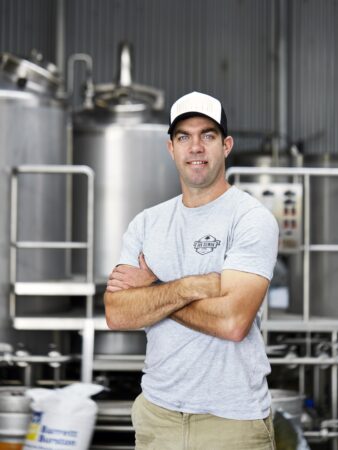The Independent Brewers Association (IBA) will fire a new salvo against multinational brewers in their battle for the $740m Australian craft beer industry, launching the IBA Independence Seal in Melbourne tomorrow.
The IBA hopes the seal will be rolled out over coming months and will be seen on beer packaging, tap points and marketing materials in an effort to help consumers to identify an independent craft beer
The IBA claim larger companies, such as Carlton United Breweries, Lion, Coles and Woolworths are using the term ‘craft beer’ for their products, such as James Squire, Little Creatures and Mountain Goat, and that this can mislead the public into thinking some popular craft beers are being made by small independent brewers.
“Independent Australian beer accounts for two per cent of annual national beer sales. Approximately 47 per cent of the craft beer market is controlled by the two big brewers and their stable of ‘faux craft’ brands,” IBA board member and director of Van Dieman Brewing, Will Tatchell, said.

The IBA classifies an independent brewer as one who produces less than 40 million litres per annum, and has no more than 20 per cent ownership by any other brewer that produces more than 40 million litres.
“As an industry body, we have recognised that the term ‘craft’ is difficult to define, hence why we have moved to using ‘independence’. We feel it’s far more reflective of who our membership base is and the attitude with which they produce their products.
Despite a win in tomorrow’s federal budget where all beer kegs over eight litres will be taxed the same, Tatchell said the IBA would continue to meet the challenge of helping independent craft brewers achieve growth without the need to be bought out by much larger operators.
“We’re trying to open markets through actively lobbying the Government to look at tap contracts and how they’re significantly limiting the components to small independent brewers,” Mr Tatchell said.
“[The IBA is] lobbying for excise reform for small brewers by way of increasing the level of the brewery refund to be on par with the WET (Wine Equalisation Tax) rebate received by wineries, indexing the brewery refund so that it keeps up with the increases in excise, changing the excise settlement period and reducing volumetric vessel limitations.
“The Australian beer sector, and its consumers, benefit heavily from a broad and diverse market offering, and the rise of independent beer needs to continue in order for independent breweries to showcase the quality and array of beer styles available,” Mr Tatchell said.
The craft, or independent, beer industry continues to experience explosive growth of around 10 per cent per annum, dwarfing that of mainstream beer consumption which is averaging around two per cent growth per annum, however, this presents an issue.
“Large corporations obviously want access to a lucrative and growing market, but craft brewers also need access to capital, better distribution deals and marketing expertise,” Queensland University of Technology Association Professor, Gary Mortimer, published in an article for The Conversation.

“Like all business, many craft breweries reach a point that in order to grow, they need access to capital and expertise. Selling to a global beer producer provides greater access to distribution channels, advanced technology, marketing and management expertise, as well as global expansion opportunities.
“While some brewers are happy to stay small, many seek growth opportunities in order to reduce costs of doing business. The economics of brewing disadvantages smaller brewers – they face higher costs for raw materials and other inputs. Joining up with a large producer means craft brewers can take advantage of economies of scale or simply maintain market share in a crowded market.
“For the big companies, buying into craft brewing is a no brainer. The size and growth of the sector has largely come at the expense of traditional, mass produced beer. Just as soft drink manufacturers have diversified into bottled water, craft brewing is an opportunity for big companies to tap into a fast growing market.
“In fact, as the market for mainstream beer flat lines, big beer producers are left with only two choices; invent their own craft beers or buy craft breweries,” Associate Professor Mortimer said.
“In the end, it is likely the craft beer segment will continue to grow, as recent taste and lifestyle trends continue to favour the segment. Accordingly, global beer and soft drink producers will continue to expand in this market through takeovers and acquisitions. But this is unlikely to be the end of the story, drinkers may soon see the emergence of two new segments – mass-craft and “true” craft.”
Or pretty much what will come to pass tomorrow.

